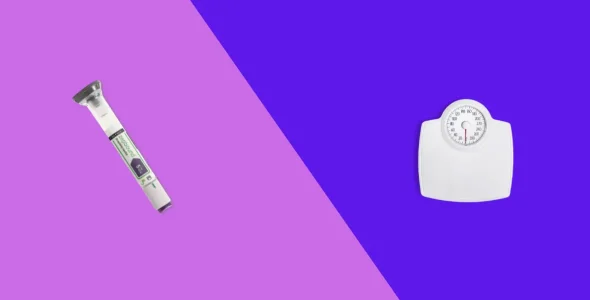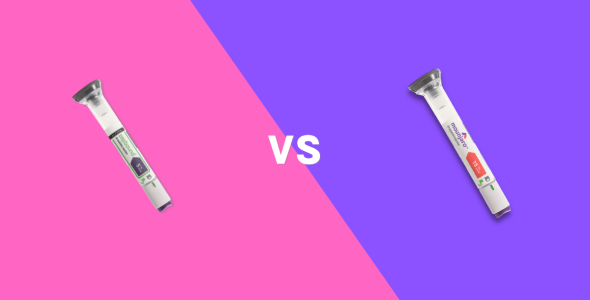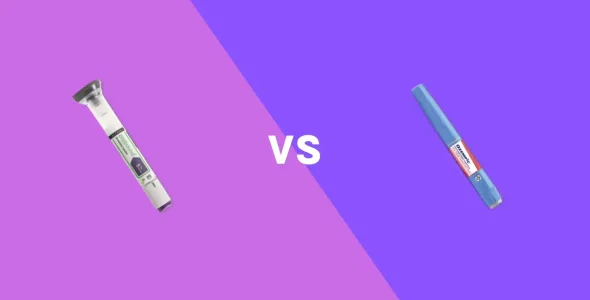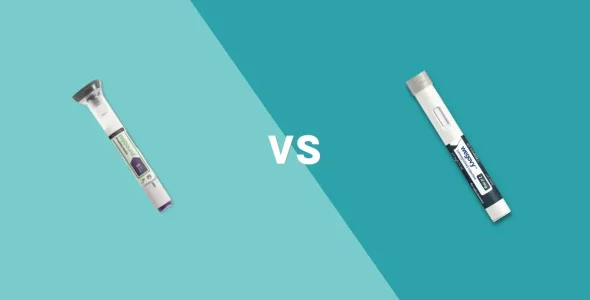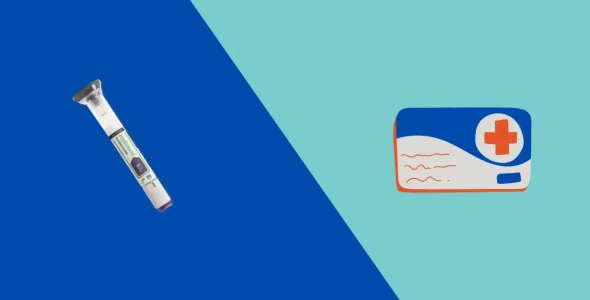Does BCBS (Blue Cross Blue Shield) cover Zepbound? A complete guide to insurance coverage
Key highlights
- Zepbound is an FDA-approved subcutaneous injection prescribed to patients with obesity and overweight with a weight-related medical condition. It's also approved for obstructive sleep apnea.
- Insurance coverage with BCBS varies by plan. Some plans may cover Zepbound if certain criteria are met. Check your insurance plan documents or contact your insurance provider for coverage details.
- BCBS Michigan will no longer cover GLP-1 agonist weight loss drugs like Zepbound, Wegovy, and Saxenda from January 1, 2025.
- If you are unable to obtain coverage for Zepbound, you can still save on Zepbound by using manufacturer savings cards, prescription discount cards, single-dose vials, and compounded tirzepatide.
Zepbound is a popular weight loss drug prescribed to obese and overweight patients for chronic weight management and obstructive sleep apnea along with lifestyle changes like a low-calorie diet and physical activity. It’s an expensive drug that costs about $1,086 per month without insurance, but with the right insurance coverage, it can be more affordable.
Some Blue Cross Blue Shield (BCBS) plans cover Zepbound for its members if certain criteria is met, but BCBS Michigan is changing its policy for the coverage of weight loss drugs starting from January 1, 2025. BCBS is implementing this change in line with other health insurers and employers in response to rising drug costs.
Our comprehensive guide will clarify BCBC’s coverage for Zepbound including the new prior authorization criteria and alternative options in case you can’t obtain insurance coverage.
What is Zepbound?
Zepbound is a subcutaneous weight loss injection approved by the U.S. Food and Drug Administration (FDA) for chronic weight management. It has been approved for weight loss and obstructive sleep apnea in patients with obesity and overweight (with a weight-related health condition) to manage weight with a low-calorie diet and increased physical activity. It is prescribed to patients with:
- Obesity (with a BMI of 30 kg/m2 or higher), or;
- Overweight (with a BMI of 27 kg/m2 or greater) and with at least one weight-related medical problem such as type 2 diabetes mellitus, hypertension, sleep apnea, cardiovascular disease, or dyslipidemia.
Tirzepatide is the active ingredient in Zepbound. It is the only approved single-molecule compound that activates both GIP (Glucose-dependent insulinotropic peptide) and GLP-1 (glucagon-like peptide-1) receptors in the body. GLP-1 and GIP are incretin molecules that stimulate beta cells in the pancreas to release insulin. The dual agonism reduces appetite, helping to manage weight more easily. Tirzepatide is an effective weight loss drug as proven in clinical trials. It also helps regulate blood sugar levels. Mounjaro, which contains the same active ingredient, tirzepatide, is another prescription drug by Eli Lilly that is FDA-approved for type 2 diabetes.
Common side effects of GLP-1 drugs include gastrointestinal side effects like diarrhea, constipation, nausea, vomiting, and stomach ache. Other side effects of Zepbound include kidney and gallbladder disease, hypoglycemia, pancreatitis, allergic reactions, injection site reactions, and suicidal thoughts. The medication also comes with a boxed warning for the risk of thyroid c-cell tumors.
Does Blue Cross Blue Shield cover Zepbound?
Yes, BCBS (Blue Cross Blue Shield) may cover Zepbound, but it depends on the specific plan and individual circumstances. Coverage varies by state, plan type, and formulary.
Some BCBS plans may cover Zepbound if certain criteria are met. It’s essential to check your insurance plan documents or contact your insurance provider for specific coverage details.
BCBS’s coverage for prescription medications typically works as follows. You are required to pay for your prescription’s full cost up-front until you’ve reached your deductible amount. After you’ve met your deductible, you’ll pay the out-of-pocket cost of the copay or coinsurance amount for covered drugs, which is determined based on the drug’s payment tier and your drug benefits.
BCBS Michigan changed the prior authorization criteria for Zepbound (tirzepatide), Wegovy (semaglutide), and Saxenda (liraglutide) from August 1, 2024, through December 31, 2024. If the original prescriber does not have an established relationship with the patient, the patient will need to consult the healthcare practitioner again to obtain prior authorization for the medication under the updated criteria.
However, starting from January 1, 2025, Blue Cross Blue Shield Michigan will no longer cover any GLP-1 weight loss drugs, including Zepbound, Saxenda, and Wegovy, for fully insured large group commercial members. Existing members with a different plan renewal date (other than January 1) will lose their coverage on the renewal date.
Factors that influence BCBS coverage for Zepbound
When evaluating BCBS coverage for Zepbound, it’s important to consider the various factors that influence coverage including your specific plan type, formulary tier, medical necessity, and prior authorization.
Plan type
BCBS offers various plan types including HMO, PPO, POS and Medicare. Each plan type has its own coverage criteria. Review your plan documents or speak with your insurance provider to verify Zepbound coverage.
Formulary tier
Check your BCBS formulary list (list of covered drugs) to find out if Zepbound is covered as a preferred drug. Your out-of-pocket costs are based on the drug tier. Higher tiers have higher copays and coinsurance costs.
Medical necessity
If your insurance plan covers Zepbound, you will likely be required to meet certain criteria for coverage including:
- You are using the medication for chronic weight management or obstructive sleep apnea.
- You are an adult with obesity (body mass index (BMI) of 30 or more) or overweight (body mass index (BMI) of 27 or more) with at least 1 weight-related condition like type 2 diabetes, hypertension, obstructive sleep apnea, dyslipidemia, or coronary heart disease.
- You have participated in a comprehensive weight management program that promotes behavioral changes, a reduced-calorie diet, and increased physical activity with continual follow-up for at least 3 months before starting on the medication.
- You are not using any other weight loss products such as Wegovy or Saxenda.
- You have tried both of the preferred medications (Wegovy and Saxenda) unless you have a valid medical reason (e.g. intolerance to the other medication, inadequate treatment response, contraindications).
- You may be required to complete a prior authorization that includes clinical evidence provided by your healthcare provider.
Prior authorization for Zepbound
Many BCBS plans require prior authorization for Zepbound coverage. To verify if your BCBS plan requires prior authorization (“PA”), contact your plan provider, or check the drug formulary (list of covered drugs) on the BCBS website or your insurance plan documents. If it says “PA” next to Zepbound, that means that a prior authorization is needed before coverage is approved.
Prior authorization is a process that involves your healthcare provider submitting clinical documentation to the insurance provider that justifies that Zepbound is medically appropriate for you and that you meet the conditions for coverage including your medical diagnosis, weight, BMI, and verification that you’ve tried step therapy (tried and failed less expensive drugs) and lifestyle modifications. The insurance provider requires this documentation to ensure that the medication is being prescribed appropriately. If the prior authorization is not approved, your coverage will be denied. Most prior authorizations are approved for a set period of time, usually one year, and once they expire, your healthcare provider will need to submit a new prior authorization for future coverage.
You should work closely with your healthcare provider to gather all of the necessary documents for the prior authorization and follow up on the request status.
The manufacturer Eli Lilly offers a resource guide on prior authorizations for Zepbound with more information which can be shared with your healthcare provider.
Appealing a denial
If your insurance provider denies the prior authorization, you have the right to appeal. Find out why your prior authorization was denied and work with your healthcare provider to submit an appeal. Your doctor may be required to provide new clinical evidence to satisfy the coverage criteria in order to demonstrate that Zepbound is medically necessary for your condition.
If your appeal is denied, there are other ways to lower the cost of Zepbound without insurance.
How to check if your BCBS plan covers Zepbound
BCBS is a network of multiple different insurance companies and independent licensees of the Blue Cross constituting Blue Cross and Blue Shield, Blue Cross, Blue Shield, CareFirst, Anthem, Highmark, and others. Each company has its own coverage options, plans, and policies, which may change at any time. You can check if your BCBS plan covers Zepbound by following these steps:
- Review your policy documents: Carefully review your BCBS plan documents or member handbook for specific details on prescription drug coverage for weight loss drugs including Zepbound.
- Check the drug formulary for Zepbound on the BCBS website or app: Visit your BCBS insurance provider’s website to review the most recent formulary. The formulary contains a list of the drugs covered by your health plan. The provider may change the drugs in the formulary frequently, so always check the date to ensure you’re seeing the latest version.
- Contact BCBS customer service: Dial the phone number on your insurance card or the official BCBS website for any queries and concerns related to your plan’s coverage. You can ask them:
- Does my insurance plan cover Zepbound?
- How much will I need to pay for Zepbound if my plan covers it?
- Does my doctor need to do anything such as submit a prior authorization (PA) before my coverage is approved by BCBS?
- What is my deductible?
- How much does my insurance plan cover?
- How much do I need to pay if my plan does not cover Zepbound?
- Contact the manufacturer (Eli Lilly): Call 1-800-LillyRx (1 800-545-5979) to talk to an agent from Eli Lilly who can verify your coverage information. You can also check coverage details on the Zepbound website.
How to save on Zepbound without insurance coverage
Fortunately, there are multiple options for you to save on Zepbound including:
- Compounded tirzepatide: You can obtain compounded tirzepatide through the NiceRx Weight Loss Program which is available at a fraction of the cost of brand-name drugs like Zepbound and Mounjaro, without the need for insurance coverage for your weight loss medication.
- Manufacturer savings card: You can also consider using the Zepbound Savings Card which provides savings to commercially insured individuals (without any government insurance) with and without coverage for Zepbound. If you have insurance coverage for Zepbound, you can pay as low as $25 for a 1, 2, or 3-month supply. If you are commercially insured and without coverage for Zepbound, you can pay as low as $650 for a 1-month prescription
- Single-dose vials: The manufacturer, Eli Lilly, is also selling Zepbound single-dose vials the lower 2.5 mg and 5 mg strengths that you can buy directly on the LillyDirect website at affordable prices – $399 for the 2.5 mg vial (4-week supply) and $549 for the 5 mg vial (4-week supply).
- Pharmacy discount cards: You can use prescription drug discount cards offered by websites like SingleCare and GoodRx to save on the cost of Zepbound at the pharmacy without insurance.
Frequently asked questions
Will BCBS cover Zepbound for diabetes?
As Zepbound is not FDA-approved for diabetes, it’s unlikely that BCBS will approve coverage. If you have been diagnosed with diabetes, speak with your healthcare provider about switching to Mounjaro which contains the same active ingredient as Zepbound (tirzepatide) and is approved for type 2 diabetes. Your insurance company is more likely to approve Mounjaro for type 2 diabetes.
What are the common reasons for prior authorization denial?
The most common reasons are that your insurance formulary has changed and the medication is no longer covered, or you did not meet the target of 5% weight loss after 3 months on the medication.
How much does Zepbound cost with BCBS insurance?
The cost varies by plan and typically depends on the drug tier and whether you’ve met your out-of-pocket limits and deductibles. Medications listed in higher drug tiers will generally have higher copays and out-of-pocket costs.
Where can I find help with my BCBS appeal?
Ask your healthcare provider to review the denial letter received from BCBS and work with them to submit an appeal. The manufacturer, Eli Lilly, provides a comprehensive resource that you can share with your healthcare provider to assist them in preparing documentation for the appeal, including a template of a letter of medical necessity.
Bottom line
Zepbound (tirzepatide) is an FDA-approved subcutaneous injection for weight loss and obstructive sleep apnea in obese and overweight individuals with weight-related health conditions like type 2 diabetes, hypertension, and cardiovascular diseases. BCBS is a network of multiple different independent insurance companies constituting Blue Cross and Blue Shield, Blue Cross, Blue Shield, CareFirst, Anthem, Highmark, and others. Each company has its own coverage options, plans, and policies, which may change at any time.
Subject to meeting the coverage criteria, some BCBS plans cover Zepbound and other GLP-1 agonist weight loss medications, but BCBS Michigan will not offer coverage for GLP-1 weight loss drugs starting from January 1, 2025. Most plans require prior authorization before coverage is approved, and you’ll need to work closely with your healthcare provider to submit clinical documentation as required by BCBS.
For those without insurance coverage, Zepbound costs over $1,000 per month. If you are unable to obtain coverage through BCBS, you can consider other options such as the Zepbound Savings Card or compounded tirzepatide, which contains the same active ingredient as Zepbound and Mounjaro.




